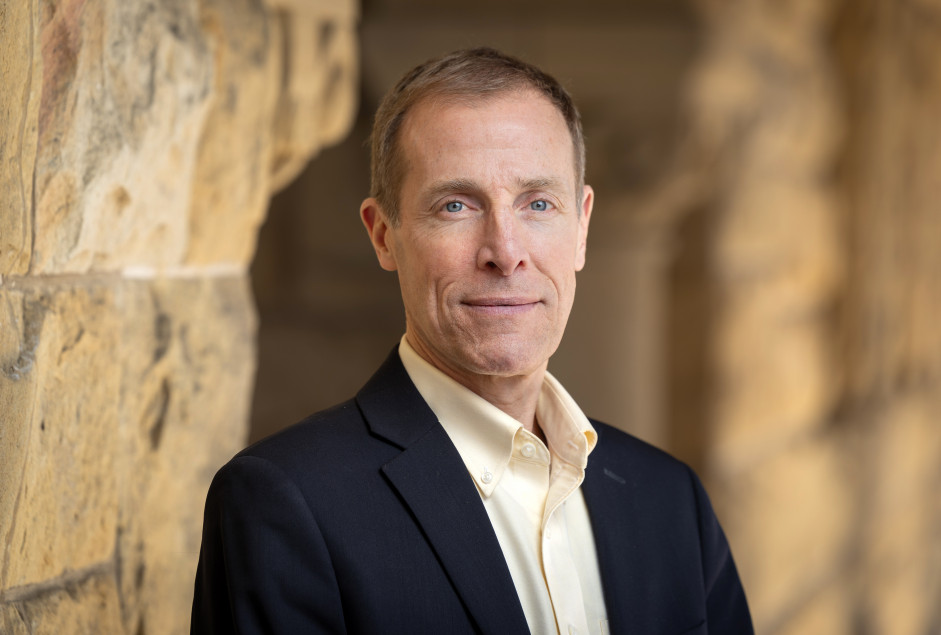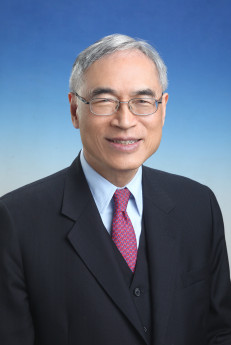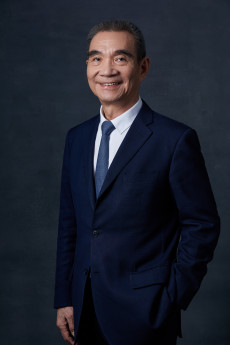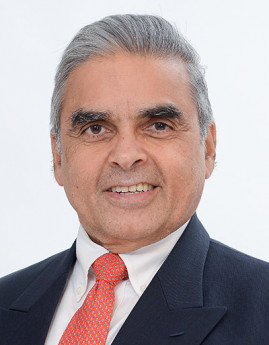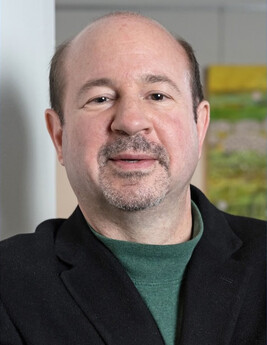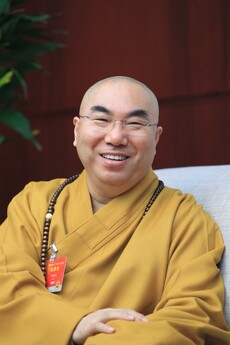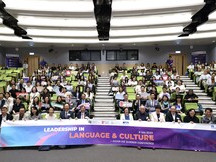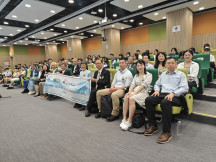EdUHK to Confer Honorary Doctorates and Honorary Fellowship on Distinguished Individuals
The Education University of Hong Kong (EdUHK) will hold an Honorary Awards Ceremony on 26 September (Friday) to confer honorary doctorates and an honorary fellowship on six distinguished individuals, in recognition of their exceptional contributions to their respective fields and to the University, the education sector and the wider community. The recipients (in alphabetical order of surnames) are:
Honorary Doctorates
- Professor James J. Gross
- Professor Lawrence J. Lau, GBS, JP
- Professor Justin Yifu Lin
- Professor Kishore Mahbubani
- Dr Michael E. Mann
Honorary Fellowship
- The Venerable Kuan Yun, BBS, MH
Professor James J. Gross
Doctor of Education, honoris causa
Professor James J. Gross is a leading expert in psychology, particularly in the area of emotion and emotion regulation. He is the Ernest R. Hilgard Professor of Psychology at Stanford University, where he directs the Stanford Center for Affective Science and the Stanford Psychophysiology Laboratory, and has also been Professor of Philosophy (by courtesy) at Stanford since 2023.
Professor Gross's research focuses specifically on emotions, emotion coherence and emotion regulation strategies in healthy and clinical populations. His process model of emotion regulation has led to research in many fields, including affective science, clinical science, political science and business. He has received a number of teaching and mentoring awards, including the Stanford Dean’s Award for Distinguished Teaching, the Phi Beta Kappa Teaching Prize, the Walter J. Gores Award for Excellence in Teaching (Stanford’s highest award for teaching), the Stanford Postdoctoral Mentoring Award (twice), the Society for Affective Science Inaugural Mentorship Award, and the APS Mentoring Award from the Association for Psychological Science. Professor Gross has also received research awards from the American Psychological Association, the Society for Psychophysiological Research, and the Social and Affective Neuroscience Society, as well as the Grawemeyer Award for Psychology.
In 1987, he obtained a BA in Philosophy, summa cum laude, from Yale University; was then a graduate visiting student at the University of Oxford, before becoming a predoctoral fellow on the United States government’s National Institute of Mental Health training programme in emotion research. In 1993, he received a PhD in Clinical Psychology from the University of California, Berkeley, followed by a postdoctoral fellowship at the University of California, San Francisco, which he completed in 1994.
Professor Gross has over 650 publications, which have been cited more than 250,000 times. He recently co-edited the third edition of the Handbook of Emotion Regulation, published in 2024, and has written chapters for the International Handbook of Emotions in Education (2014), The Dark and Light Sides of Positive Emotion (2014) and the Oxford Handbook of Cognitive Psychology (2013), among others.
He is co-founding President of the Society for Affective Science, Founding Co-Editor-in-Chief of Affective Science, and a Fellow of the Association for Psychological Science, the American Psychological Association, the American Association for the Advancement of Science, and the American Academy of Arts and Sciences. In recognition of his contributions, he has received Honorary Doctorates from UC Louvain in Belgium and Tilburg University in the Netherlands.
Professor Lawrence J. Lau, GBS, JP
Doctor of Social Sciences, honoris causa
Professor Lawrence J. Lau is a distinguished economist and former Vice-Chancellor of The Chinese University of Hong Kong, where he currently serves as the Ralph and Claire Landau Professor of Economics at the Lau Chor Tak Institute of Global Economics and Finance. Professor Lau specialises in economic development, economic growth and the economies of East Asia, including that of China, about which he developed one of the first econometric models in 1966. He received his BS degree (with Great Distinction) in Physics from Stanford University in 1964 and his MA and Ph D degrees in Economics from the University of California at Berkeley in 1966 and 1969 respectively. He joined the faculty of the Department of Economics at Stanford University in 1966, becoming Professor of Economics in 1976 and the first Kwoh-Ting Li Professor in Economic Development there in 1992. Between 1992 and 1996, he served as Co-Director of the Asia-Pacific Research Center, and from 1997 to 1999, as Director of the Stanford Institute for Economic Policy Research. He became Kwoh-Ting Li Professor in Economic Development, Emeritus, at Stanford on his retirement in 2006. From 2004 to 2010, he served as Vice-Chancellor (President) of The Chinese University of Hong Kong.
Professor Lau has authored, co-authored or edited nineteen books, including The China-U.S. Trade Warand Future Economic Relations, The COVID-19 Epidemic in China, Are There Laws of Innovation? and Is the Chinese Economy a Miracle or a Bubble?. He has also had published more than 220 articles and notes in professional journals.
He has earned considerable global acclaim for his contributions, and been awarded honorary doctorates by the Hong Kong University of Science and Technology, Soka University, Waseda University, National Central University, Fudan University, the Chinese University of Hong Kong, Lingnan University and the University of Macau. He has been elected a member of Phi Beta Kappa and Tau Beta Pi, a Fellow of the Econometric Society, an Academician of Academia Sinica, Taipei, a Member of the Conference for Research in Income and Wealth, an Overseas Fellow of Churchill College, Cambridge in England, and an Honorary Member of the Chinese Academy of Social Sciences.
Between 2008 and 2018, Professor Lau was a member of the 11th and 12th National Committees of the Chinese People's Political Consultative Conference, where he was also Vice-Chairman of the Sub-Committee of Population, Resources and Environment from 2010 to 2013, and Vice-Chairman of the Sub-Committee of Economics from 2013 to 2018. He is currently a Member of the Currency Board sub-committee of the Exchange Fund Advisory Committee of the Hong Kong Special Administrative Region, a Non-official Member of the Candidate Eligibility Review Committee of the Hong Kong Special Administrative Region, and a Non-official Member of the Board of Directors of the Hong Kong Investment Corporation.
Professor Justin Yifu Lin
Doctor of Social Sciences, honoris causa
Professor Justin Yifu Lin currently serves as a Standing Committee member of the Chinese People's Political Consultative Conference (CPPCC) National Committee, Vice Chairman of the Committee on Economic Affairs of the CPPCC National Committee, Dean of the Institute of New Structural Economics at Peking University, Honorary Dean of the National School of Development at Peking University, and Honorary Dean of the Institute of South-South Cooperation and Development. He was previously Chief Economist and Senior Vice President for Development Economics at the World Bank, and is highly regarded in the international economics community as an authoritative scholar on Chinese issues.
Born in Taiwan, China, Professor Lin initially enrolled at the College of Agriculture at National Taiwan University. He later joined the army and attended the Army Academy. After graduation, he pursued further studies at the Graduate Institute of Business Administration at National Chengchi University in Taiwan. During the era of China's reform and opening-up, driven by his passion for the country, Professor Lin went to Peking University to study for a master's degree in economics. He then completed his PhD in economics at the University of Chicago, USA. In 1987, he returned to China to serve as Deputy Director of the Development Research Institute at the State Council's Rural Development Research Centre, conducting research in China's rural reform policies.
In 1994, he founded the China Center for Economic Research at Peking University and participated in the formulation of the country's economic reform policies, including telecommunications reform, accession to the World Trade Organisation, financial reform and rural development. In 2008, Professor Lin was appointed as Chief Economist and Senior Vice President of the World Bank, becoming the first person from a developing country to hold this key position. After stepping down, he returned to Peking University to continue his research and teaching work.
Professor Lin has a prolific academic output, having published over 300 papers in domestic and international academic journals and received numerous academic honours. His book Institutions, Technology, and China's Agricultural Development won the Sun Yefang Economic Science Award, while Re-examining Institutions, Technology, and China's Agricultural Development won First Prize in the Third Humanities and Social Sciences Outstanding Achievement Awards for Chinese Universities from the Ministry of Education of China. In 1993, he received the Best Policy Paper Award from the International Food and Agricultural Policy Research Center at the University of Minnesota, USA. In 1997, he was awarded the Sir John Crawford Award from the Australian Agricultural and Resource Economics Society, and in 2000, he won the Classic Citation Award from the Social Sciences Citation Index in the USA.
In recent years, Professor Lin has been involved in planning the development of the Greater Bay Area, including Hong Kong's economic direction, offering strategies for Hong Kong to leverage its advantages and integrate into the development of the Area.
Thanks to his outstanding academic achievements, Professor Lin has been elected as a Fellow of the World Academy of Sciences and a Foreign Member of the British Academy. He has also received honorary doctorates from more than ten universities worldwide, including institutions in Hong Kong.
Professor Kishore Mahbubani
Doctor of Humanities, honoris causa
Professor Mahbubani is a leading voice internationally in the field of public policy, and has pursued careers in both diplomacy and latterly academia.
Between 1971 and 2004, he worked for the Singapore Foreign Service, holding postings in Cambodia, Malaysia, Washington DC and New York, where he was the first Singaporean Ambassador on the UN Security Council and served as the Security Council’s President in January 2001 and May 2002. He was Permanent Secretary at the Foreign Ministry from 1993 to 1998 and was conferred the Public Administration Medal (Gold) by the Singapore Government in 1998 for his achievements.
Professor Mahbubani was awarded the President’s Scholarship, regarded as the most prestigious public undergraduate scholarship in Singapore, in 1967. He graduated with a first-class honours degree in philosophy from the University of Singapore in 1971. From Dalhousie University, Canada, he received a master’s degree in philosophy in 1976 and an honorary doctorate in 1995. He spent a year as a fellow at the Center for International Affairs at Harvard University from 1991 to 1992.
In 2004, Professor Mahbubani joined academia on being appointed Founding Dean of the Lee Kuan Yew School of Public Policy, National University of Singapore, a position he held until 2017, and was Professor in the Practice of Public Policy from 2006 until 2019. He has authored ten published books, including The New Asian Hemisphere, The ASEAN Miracle (co-authored with Jeffery Sng), The Asian 21st Century, and his memoir Living the Asian Century in 2024.
Professor Mahbubani is the first Singaporean to publish articles in globally renowned journals and newspapers such as Foreign Affairs, Foreign Policy, the New York Times and the Financial Times, and has co-authored articles with global thought leaders including Kofi Annan and Larry Summers.
He has received significant international recognition for his accomplishments, including the Foreign Policy Association Medal in June 2004. He was listed as one of the top 100 public intellectuals in the world by Foreign Policy and Prospect magazines in September 2005 and included in the March 2009 Financial Times list of Top 50 individuals who would shape the debate on the future of capitalism. In 2010 and 2011, he was selected as one of Foreign Policy’s Top Global Thinkers, and in 2014, he was named one of the top 50 world thinkers by Prospect magazine. In April 2019, he was elected as an honorary international member to the American Academy of Arts and Sciences, which has honoured distinguished thinkers since 1780.
Dr Michael E. Mann
Doctor of Humanities, honoris causa
Dr Michael E. Mann is a prominent climate scientist serving as Presidential Distinguished Professor in the Department of Earth and Environmental Science at the University of Pennsylvania, where he also holds the role of Vice Provost for Climate Science, Policy and Action, and is Director of the Penn Center for Science, Sustainability, and the Media.
Dr Mann’s research focuses on the Earth's climate system and the science, impact and policy implications of human-caused climate change. He was a Lead Author for the Third Assessment Report of the Intergovernmental Panel on Climate Change (IPCC) in 2001 and, alongside other IPCC authors, contributed to IPCC’s Nobel Peace Prize in 2007. He was also organising committee chair for the National Academy of Sciences ‘Frontiers of Science’ in 2003.
Dr Mann received his undergraduate degrees in Applied Math and Physics from the University of California at Berkeley in 1989, an MS and MPhil degrees in Physics from Yale University in 1991, and a PhD in Geology & Geophysics from Yale University in 1998.
Over his career, Dr Mann has received numerous accolades. He was selected by Scientific American as one of the fifty leading visionaries in science and technology in 2002, and awarded the Hans Oeschger Medal of the European Geosciences Union in 2012. In 2013, he was awarded the National Conservation Achievement Award for science by the National Wildlife Federation and made the Bloomberg News list of the fifty most influential people. Between 2014 and 2018, he received the Friend of the Planet Award from the National Center for Science Education, the Stephen H. Schneider Award for Outstanding Climate Science Communication from Climate One, the Award for Public Engagement with Science from the American Association for the Advancement of Science, and the Climate Communication Prize from the American Geophysical Union. He received the Tyler Prize for Environmental Achievement in 2019 and was elected to the US National Academy of Sciences in 2020. In 2023, he was named Humanist of the Year by the American Humanist Association, and in 2024 he was elected a Foreign Member of the Royal Society, UK.
As an influential voice in climate science, Dr Mann has authored over 300 peer-reviewed and edited publications, numerous op-eds and commentaries, as well as seven influential books, including Dire Predictions, The Hockey Stick and the Climate Wars and The New Climate War.
Dr Mann is a Fellow of the American Geophysical Union, the American Meteorological Society, the Geological Society of America, the American Association for the Advancement of Science, and the Committee for Skeptical Inquiry. He is also a co-founder of the award-winning science website RealClimate.org.
The Venerable Kuan Yun, BBS, MH,
honorary fellow
The Venerable Kuan Yun is the current President of the Hong Kong Buddhist Association and the Abbot of Western Monastery. Originally from Liaoning Province in China, he moved to Hong Kong in 1983. In 1986, he was ordained under the guidance of the late Venerable Wing Sing, becoming the 46th lineage holder of the Tiantai school of Chinese Buddhism.
In 2016, he was unanimously elected President of the Hong Kong Bodhi Siksa Society. Over the years, he has founded several institutions, including the Guanyin Lecture Hall, Puxian Hall, the Bodhi Siksa Cultural and Educational Centre, and Hong Kong Tung Lum Pure Land Institute. He also played a key role in establishing the CUHK Centre for Buddhist Studies, restoring the Youshun Temple in Chaoyang, Liaoning, and founding the Yongxing Buddhist Research Centre and Study Institute at Liaoning University. Additionally, he has launched the ‘Bodhi Online’ platform to provide spiritual counselling and support.
The Venerable Kuan Yun has also been active in public service. He served as a member of the 12th to 14th National Committees of the Chinese People's Political Consultative Conference, and has held roles such as member of the China Committee on Religion and Peace and advisor to the Chinese Foundation for Prevention of STDs and AIDS.
A prolific and influential writer, his works include The Collection of Causes and Conditions in the World, The Ethical Teachings of the Good Life Sutra and The Path to a Happy Family, and The Buddha's Teachings on the Stars and the Art of Living.
In recognition of his contributions to charity and humanitarian efforts, the Venerable Kuan Yun was awarded the Outstanding Contribution to Chinese Charity Award and named a Chinese Charity Figure in 2007. In 2023, he received the Compassion Award from the Hong Kong & Macau Taiwanese Charity Fund. In July 2025, he was awarded the Bronze Bauhinia Star by the Chief Executive of Hong Kong SAR in recognition of his notable contributions to the preaching of Buddhism to the community, as well as development of charitable services and educational works for the betterment of citizens.
—Ends—




